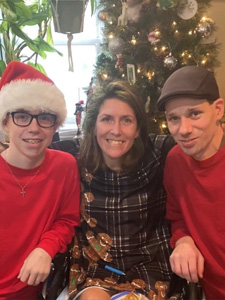
Kevin’s life was turned upside down by a mugging on the street in New York City in 2013. He had just left his office, where he worked 60-hour weeks as an IT project manager, and was on his way to meet friends when he was attacked and stabbed in the stomach.
Fortunately, he was rushed to a nearby hospital and survived. But his ordeal didn’t end there. In the years since the attack, he’s had a dozen major surgeries, including the removal of his gallbladder, right kidney, and appendix, plus a gastric bypass and ulcers.
Along with the physical struggles, Kevin, who’s 41 and lives some 70 miles north of New York City in Poughkeepsie, N.Y., has faced overwhelming hospital bills. Initially, many bills were covered by his insurance, but now he’s on disability due to his injuries.
“I didn’t know what to expect”, says Kevin, “especially after I lost my insurance and then lost Medicaid.”
Kevin was referred to Dollar For by SaverLife, a nonprofit organization that helps consumers save more, build financial stability and improve their financial health.
With help from Dollar For, Kevin applied for medical debt relief in April. In August, he learned that New York-Presbyterian Hospital had forgiven one bill for $2,080. He also got more bills from Poughkeepsie’s Vassar Brothers Health crushed.
“It’s been pretty rough financially since I was injured,” Kevin says. “Money can get tight, so I appreciate that there are people out there who care … organizations that help people in my position.”
He’s now on Medicare, but that doesn’t cover everything, he notes. Last year, he had over $1 million in hospital bills, “and this year isn’t much better.” He’s also been on payment plans with individual doctors.
But once he knew who to contact, “it was a quick and easy process” to apply for charity care.
Kevin and his ex have an active 15-year-old son, so the money saved from hospital bills will help with things his son needs.
What advice would he give to someone else facing large hospital bills? “Look for charity help! Initially, I wasn’t even aware there were options” to having to pay a huge bill, he recalls.
Now, “hopefully one day I can pay it forward.”
